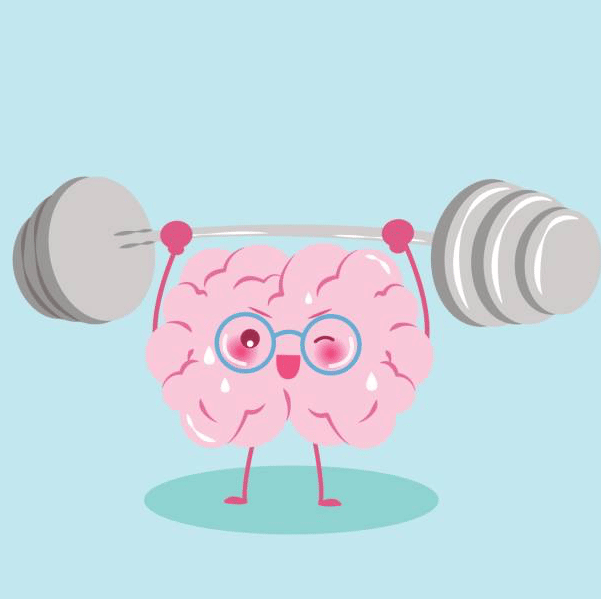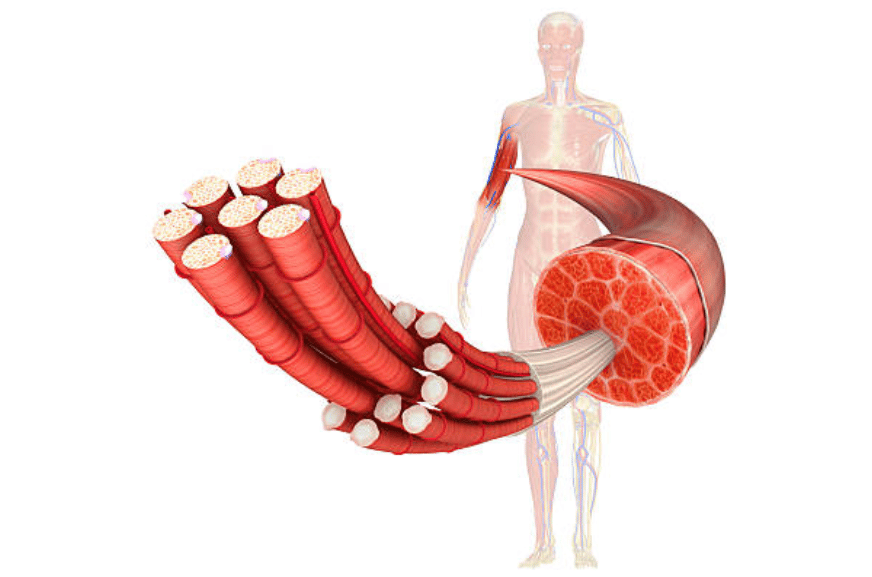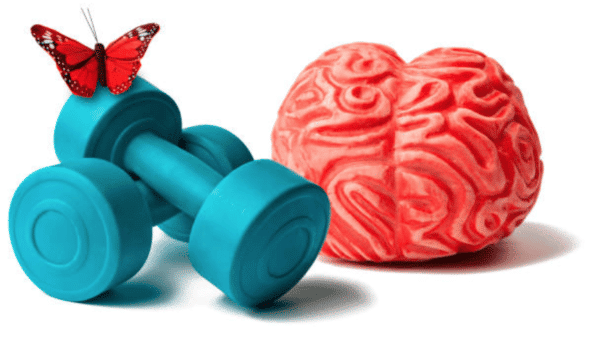If you practice bodybuilding, you are probably familiar with the concept of muscle memory. This phenomenon would allow athletes to recover more quickly their capacities to reproduce performances following a extended shutdown of physical activity and muscle wasting. But does this muscle memory really exist? And, if so, how do the body and the brain work to facilitate this muscle recovery?
What is muscle memory?
Building muscle is a long process that requires patience, perseverance and the ability to motivation. Several years and a lot of rigor are generally necessary to optimize a muscle development.
Unfortunately, this work and involvement can be stopped at any time by a injury for example (tendonitis, muscle pain, etc.). Other reasons such as a holiday, a change in professional life or the arrival of a child may force you to temporarily stop your previously intense physical and sporting activity.
If this were to happen, the muscular growth that you were acquiring at the gym would naturally be slowed down. After several months, this would inevitably lead to a muscle lossand therefore also a weight loss and volume.
Depending on the length of time you stop playing sports, the loss of strength can also be more or less important. But then what happens when you start building muscle again? Is it possible to recover muscle mass and strength quickly?
This is where muscle memory comes in. The latter refers to a connection between the muscles and the brain which would allow an athlete who has previously repeated a movement to recover his or her abilities more easily.
Muscle memory: the scientific approach
Several scientific studies have highlighted the impact of sport participation on theindividual DNA. Just like running or swimming, weight training generates epigenetic changes. These modifications often help to reduce the risk of developing pathologies such as diabetes or cardiovascular diseases. But does muscle memory reside in our modified genes?
When you work out, your nervous system (the brain) gives orders to the muscle fibres. This information passes through the neurons and the spinal cord to be executed in coordination. This is called the motricity.
Years of intense training causes a change in the cells that make up our muscle fibres. Each muscle group is therefore marked by past growth.
During a workout in the weight room, the destruction of muscle fibers is at the origin of two processes:
- l'hypertrophywhich refers to the increase in size of these fibres,
- hyperplasia, which is the increase in the number of muscle fibres.
During your rest phases, the muscle fibers that were torn during the workout are rebuilt. This is what natural process of the organism that causes the increase in volume of our muscles.
After an injury, during the healing phase, muscle precursor cells (myoblasts) divide and fuse together to form so-called myotubes. These are actually cells with several nuclei. The myotubes then develop into myocytes. These grow by increasing the volume of the cytoplasm (the area between the cell membrane and the nuclei). This explanation is a bit technical, but it will help you to understand the rest.
By increasing the number of strength training sessions, the body will build a greater number of cores in the muscle cells. These nuclei are essential because they allow you to rapidly increase the size and number of muscle fibres when needed. The organism keeps track of your sports activity thanks to these nuclei which remain in your muscle cells, even when you are out of exercise.stop training.
In the event of a prolonged interruption of your workoutsIf you are not active, all those cores and new muscle tissues and fibres created by training will still be present. The absence of activity will of course cause a muscle wasting and a loss of strength. But when you do return to training, you will recover the lost muscle more quickly than if you had never done any weight training. Rebuilding your muscles will obviously not happen in a week, but it will be easier. The same goes for your strength.
A few months after the resumption of sportYou will then regain your level. The shorter the period of inactivity, the quicker you will be able to recover your sensations. Similarly, the number of years of physical activity before stopping plays a fundamental role in the body's ability to develop muscle memory.
How do I get back into weight training after a break?
Favour a gradual recovery
When you return to weight training, the weights you lift will not be as heavy as before. Don't worry, this is perfectly normal. It is in fact advisable to start training again in a light manner and tolisten to your body. To optimize your muscle reconstructionIn order to achieve this, you will need to put your ego aside and take the time to build up your body mass gradually. In the beginning, focus on basic exercises such as the bench press, squat or pull-ups. Playing with contractions, tempos and number of reps will help you get your feel back.
In short, you should take it easy to get back into the sport so that you don't injure yourself. If you go too hard right from the start, you risk suffering a tear or muscle fatigue harmful to your body. The latter is one of the symptoms of overtraining. Even more than in normal times, the warm-ups and stretching are essential when resuming sports activities.
The role of the brain and procedural memory
During your years of weight training, your brain has recorded the movements you perform to create automatisms. This is the same process that, even after a long period of downtime, allows you to remember how to ride a bike, drive a car or play a musical instrument.
In this case, it is not muscle memory per se that is involved, but rather the procedural memory. Its role is important, because you will not start from scratch and can quickly find your sensations.
My personal experience
An injury and several months of inactivity
For those who have been following me for a long time, you know that two herniated disks have made me suffer since my adolescence. I was also a victim of repeated lumbagos and therefore took the heavy decision to have my back operated on using the herniectomy.
It was no longer possible to live with it on a daily basis. To avoid surgery, I tried different methods such as decompression or Nubax and adapted my training program by reducing dangerous weight training. This allowed me to put off the surgery for several years.
Unfortunately, the herniectomy was a failure because of the complications that followed. I was the victim of a nosocomial infection probably related to poor cleaning of the instruments. If it had not been detected in time, this bacterial infection could have led to irreversible paralysis.
Known as spondylodiscitis, this disease had time to eat away at my discs and vertebrae on the L4-L5 level and paralyzed me for three months in hospital. Under perfusion and without being able to move or eat properly, the muscle catabolism quickly had an effect. Result: I lost almost 20 kilograms. As part of my healingI was forced to wear a corset for another three months.
The role of muscle memory in my return to sport
I was able to gradually resume strength training with body weight in half body, then in full body. I then added exercises with elastics, then started working on weight machines. I ended up reintegrating movements with free weights (dumbbells).
In order not to put too much strain on my back, I cut out the abdominal crunches for a few months. I also banned from my routine exercises such as the deadlift and the squat with too much weight. To get back to my level faster, I focused on the quality of execution movements. I also increased the number of days off within a week.
I have of course taken over a healthy and balanced diet as soon as I leave the hospital by calculating my calories and macronutrient intake. Thanks to all these actions, my musculature has gradually returned.
Within three months, I was able to resume 7 kilogramsincluding 3 kilograms of dry muscle. My muscle strength also came back day after day, as I explain in this YouTube video.
After six months of work, I was able to find almost the entiremy entire strengthThe recovery of my back took longer, as the regeneration of the vertebrae is a long and painful process.
It took me exactly two years to get back to my pre-surgery level. This was made possible by the effect of muscle memory and by the fact that I was able to adapt my training to recover little by little.
Conclusion
After a prolonged break, your physical condition will quickly return if you resume serious training and adopt a good diet. You will need to go gradually and be patient so that the muscle memory can function. Your training programme will of course have to be adapted (on the advice of your doctor, certain exercises may for example be banned) and include warm-up and cool-down phases. You can also call on the services of a sports coach who will know how to adapt each session of your bodybuilding program according to your pathologies. Don't hesitate to give your opinion on the subject and to share your experience if you had to stop weight training.
Also read articles:
How to train with rubber bands to build muscle?













14 Comments
Topic which is also very timely for me! Having had the opportunity to experience it too often unfortunately, but in the end it's true that you don't start from scratch and that's the good thing! Always very interested in your clear and precise articles! 🙂
Hi Julien
Very good article
Get well soon
Jo Ribera
DEATH FIT...
Hello julien ,
First of all, I wish you a good recovery.
Former mountain instructor in the alpine hunters, I had a lot of accidents and a few stops, one of which lasted six months. So yes, the recovery is very hard but our body has an enormous capacity and we quickly find the right sensations and the right gestures to regain muscle mass and strength.
There is a step to take on the fear of over injury or so-called imaginary pain that can remain and slow down progress.
Despite my five mountaineering accidents, I am now involved in skydiving and of course bodybuilding.
Our body is a machine with a RAM so Goooo
That's an interesting theory...
Indeed, when you see the speed with which muscle loss occurs during a prolonged break compared to the time it takes to build muscle: it was only fair that the efforts be rewarded.
I wish you a speedy recovery so that you can test this theory.
For my part I am at the gym 5/day week and I had to stop 6 months I had effectively lost my muscles with a lot of water retention since my sugar consumption has increased because when we do not do anything we tend to eat anything briefly after 3 intense months of resumption with my old programs I put back little by little and I have almost recovered my physique before the stop
Thanks julien for these clarifications. Could you do an article on stretching, that would interest me
many studies contradict each other on the subject
I'm sure you'll be able to share your experience with others, even if unfortunately the people who follow your journey didn't wish you the trouble you had.
Considering the body that you have recovered after several months of rehabilitation and training compared to before your accident, we can say hats off to you friend
bravo julien i would never have thought that you would recover your shape in a year you really have a lot of courage not to have given up after your injury
your strength of character is extraordinary champion
Julien is it that the fact of being older this memorization works in the same way? your personal opinion because I imagine our rate of testosterone descent considerably from 35 years.
Hello,
For example, during Ramadan, stopping bodybuilding leads to a decrease in strength and congestion that is no longer present. Do you think that the muscle memory works after 1 month of stopping or is it too short to talk about muscle memory?
A good article especially at this time
Yes of course as there is 1 memory for fat cells